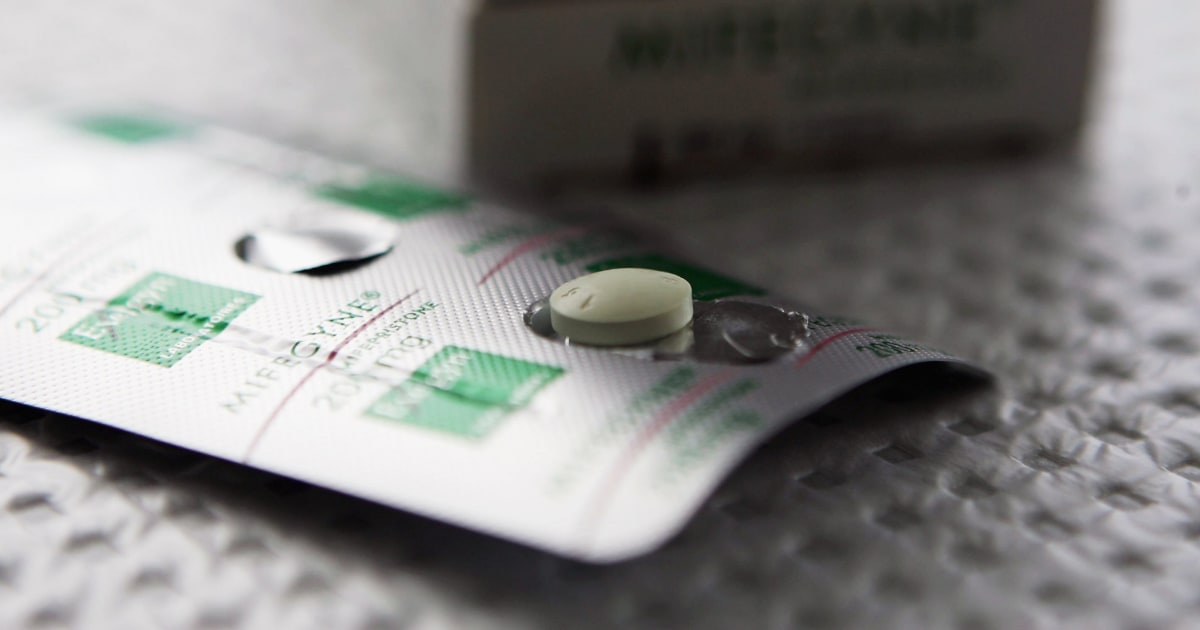
WASHINGTON — Supreme Court justices were scheduled on Friday to discuss whether to take up a high-stakes legal fight that could result in a definitive decision on federal approval of the drug most commonly used for medication abortion.
At their regular private meeting, the nine justices were due to consider three different appeals raising different legal issues, including one filed by those challenging the Food and Drug Administration’s original 2000 approval of the mifepristone pill.
The two other appeals, brought by the Biden administration and drugmaker Danco Laboratories, are seeking to uphold decisions by the FDA that made it easier to access and use the pill in recent years. Danco makes the brand version of the pill, Mifeprex.
Even the court's decision on whether to take up the appeals is of practical importance because if the justices decide not to intervene in the ongoing litigation, an appeals court ruling that limited the availability of the drug by mail would go into effect.
The court later on Friday announced it was hearing one new case but the abortion cases were not mentioned. The court could next act on Monday or later next week.
In weighing the three appeals, the justices could choose to hear a broad challenge that addresses the 2000 FDA approval or focus only on more recent changes, including a 2021 decision that made it possible to access the pill by mail.
The court, which has a 6-3 conservative majority, has previously shown hostility to abortion rights, overturning the landmark abortion rights ruling Roe v. Wade last year. But in April, in an earlier stage of the litigation, the court blocked a judge’s ruling that would have completely invalided the FDA’s approval of the drug.
The abortion pill dispute does not directly address any right to abortion, focusing instead on different legal issues about the FDA’s process for approving drugs, but the case raises questions over the court’s pledge last year that it would leave abortion policy to the states and the federal government.
Other issues raised in the cases include the 2016 decisions to extend the window in which mifepristone could be used to terminate pregnancies from seven weeks’ gestation to 10 weeks’ gestation, and reduce the number of in-person visits patients from three to one. In another 2016 move, the FDA altered the dosing regimen, finding that a lower dose of mifepristone was sufficient.
The court could also address the 2019 decision to approve a generic form of the drug, which is made by GenBioPro.
The New Orleans-based 5th U.S. Circuit Court of Appeals in August ruled that the post-2016 FDA decisions should be put on hold because the moves “were taken without sufficient consideration of the effects those changes would have on patients.” The court ruled against the challengers on their efforts to overturn the original approval of the drug and the later decision to authorize the generic version.
Both sides then filed appeals at the Supreme Court.
The current fight over the drug dates back to a November 2022 lawsuit filed by a group of doctors and other medical professionals represented by the conservative Christian legal group Alliance Defending Freedom. They claim that the FDA’s 2000 approval was flawed, as were later decisions that made the drug easier to access, in part because they failed to take into account safety risks to women.
In a sweeping decision, Texas-based U.S. District Judge Matthew Kacsmaryk in April invalidated the FDA’s original approval of the drug from more than 20 years ago. After the Supreme Court put that decision on hold while litigation continued, the appeals court narrowed the scope of Kacsmaryk’s ruling, focusing on the post-2016 changes.
The FDA-approved regimen for a medication abortion involves two drugs: mifepristone, which blocks the hormone progesterone, and misoprostol, which induces contractions. A majority of abortions in the U.S. are carried out using the pills, according to a survey conducted by the Guttmacher Institute, a research group that supports abortion rights.
Access to medication abortion, especially by mail, has become of major importance in light of the Supreme Court ruling that overturned Roe v. Wade, which has led to conservative states enacting tough restrictions that either limit or ban abortion outright. Fourteen states currently have total abortion bans, according to Guttmacher.
"hear" - Google News
December 09, 2023 at 03:02AM
https://ift.tt/a8wMHob
Supreme Court justices discuss whether to hear abortion pill showdown - NBC News
"hear" - Google News
https://ift.tt/gSdia9q
https://ift.tt/mOJAXw9
Bagikan Berita Ini














0 Response to "Supreme Court justices discuss whether to hear abortion pill showdown - NBC News"
Post a Comment